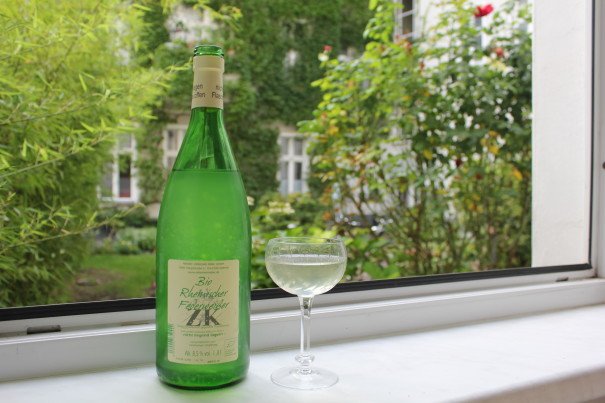
Thank God Summer Is Finally Over

Thank God Summer Is Finally Over
Federweißer in Berlin
We’d been carrying the bulbous glass bottle all over town for what seemed like hours, looking for the perfect stoop or bench. For my friend, this marked the end of one phase of life and the beginning of another: she was about to finish graduate school and start her first job, meaning her days of afternoon drinking might very well be numbered. For me, it marked something far simpler: It was September. Summer was officially over. The pressure was finally off.
Getting to the drink was easy. There was no corkscrew for this bottle; not even a twist top to untwist. We broke through the foil seal and poured out the greenish yellow contents, twisty bits of sediment dancing in the 4 o’clock sun. The first sip hits the tongue with a constellation of light bubbliness; it’s the second that brings out the drink’s fruity, somewhat tangy sweetness, and only the third that reveals the underlying funk of the yeast doing its work. Much like the month of September, it can turn—and turn on you—in an instant, but you keep taking nips at it, hoping to find a sip of sunlight once again.
This is German Federweißer, or “feather white,” a young wine made of fermented fresh grape juice and yeast, in a mixture so volatile it must be kept unsealed lest the bottle explode. That’s why you’ll see warning signs on bottles that read, “This end up! Do not lay down!” and any supermarket clerk who wants to avoid a sticky situation will remind you to keep it upright on the conveyer belt.
Because Federweißer is still in the midst of its fermentation process, you can decide just how alcoholic you want it to be. Open it right after you buy it, and it will make for a light and spritzy pre-dinner drink. Leave it for a few days and it can provide quite the night of debauchery. Germans usually drink it with Zwiebelkuchen (onion tart), perhaps in an attempt to pad its surprisingly sharp alcoholic bite with something at once sweet and savory, pillowy and crumbly. Some try to avoid this combination altogether, as the rapidly fermenting new wine and the mounds of caramelized onions can cause quite a rumbling in the stomach.
If we were in southern Germany, we might be drinking Federweißer from a wooden barrel, surrounded by thousands of other revelers. If we’d had a bit more money we could have had it from a crystal glass in a fine German restaurant on the city’s west side. But we were two young friends who had fallen in love with the city for days such as this, and as we drank we marveled at the number of coincidences—registering for the same beginners’ German class in the same month, for one thing—that had gotten us to this point.
There’s a drink for every season in Germany, and a reason to welcome every new spring and summer, but German reveling hits a feverish pace only in fall, when it’s wine season in the wine growing regions, and Oktoberfest is about to begin in Munich. The atmosphere is merry but there’s an underlying sadness: how did the days get so short so quickly, and why do we live in this strange country with dark winters and an even darker past?
As for me, I’m quite content to see summer go; to think ahead to freezing cold winter nights spent at home, during which no one will try to lure me to a beer garden, or drag me to an outdoor party, or invite me to hours of distractive drinking by the Berlin’s canals. September’s Federweißer marks a long descent into the depths of winter, when a glass of the sweet, fruity, yeasty new wine will turn into an even sweeter cup of Christmas Glühwein (mulled wine). But in between, it’ll be business as usual, and after the all-too-short but languid summer, I’m happy to get back to work.